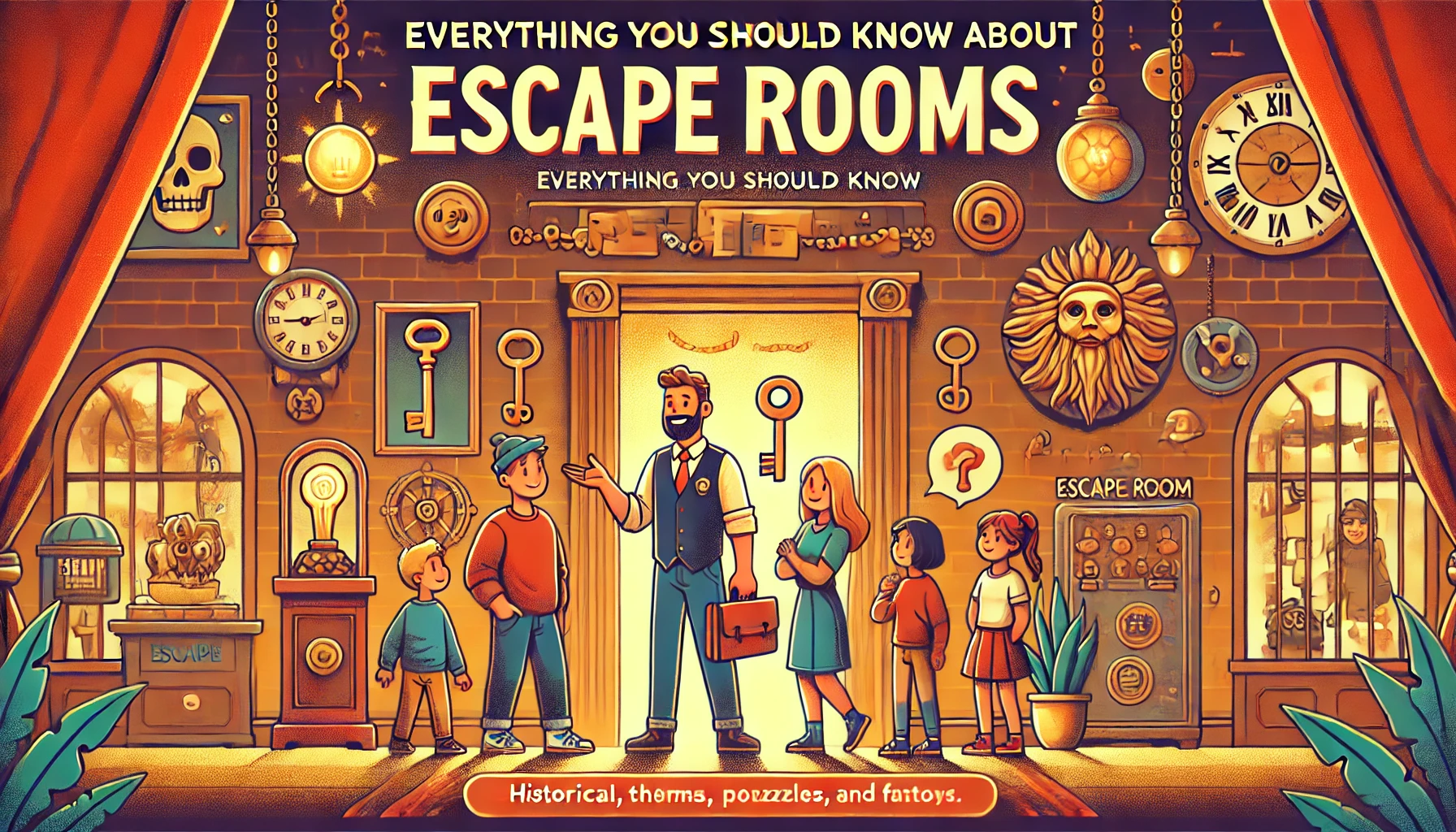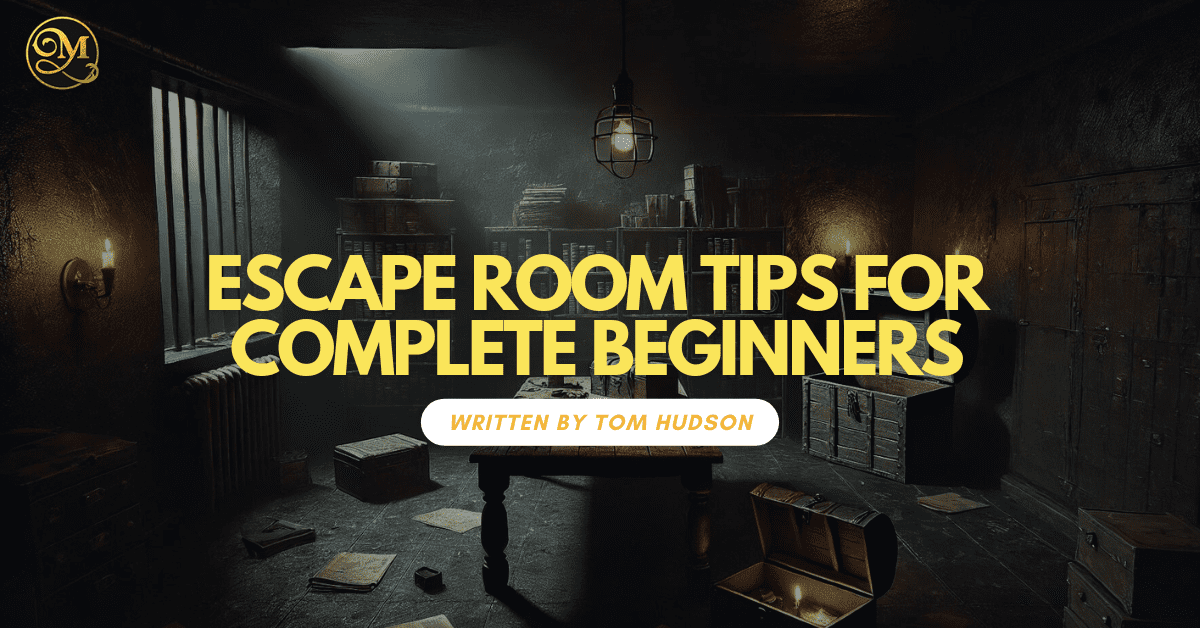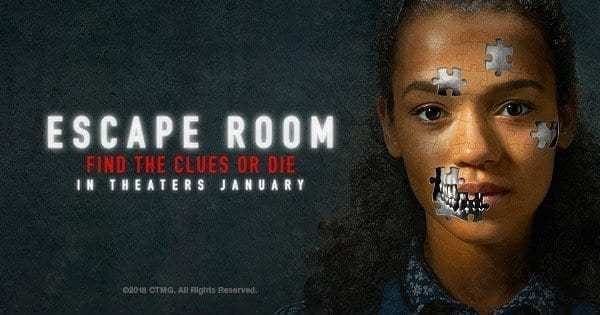The Mystery Rooms Has Just Hosted Its 2000th Game!
Admittedly it has taken 20 months, 10,000 players, 500 broken padlocks and I’ve put on 10kg to get here – but to acknowledge the milestone, I wanted to write an honest and open piece about what it has been like to operate as an independent and my tips for opening an escape room business in Melbourne.
Hopefully this will serve as a guide for other game enthusiasts to do the same.
Why would I like to see more independent Escape Rooms?
I’ve now worked in the escape room space for around 2 years. In that time, I’ve chatted with many creators, customers and enthusiasts about the genre and come to some conclusions that are most probably shared amongst other independent escape room owners.
As an independent escape room owner, I’m really keen to see other good independent escape rooms open. I don’t think that anyone in our industry is in debate with this, we all agree that a co-operative of good independent escape room owners, recommending each other to customers is a great way to grow individual revenue, improve industry reputation, increase customer satisfaction and maintain positive relationships with our customers. It’s a win-win for everyone involved.
Where it’s not a win-win however is the growing group of potential customers out there who have played just the one escape room game, been underwhelmed and never chosen to play again. Not only will they not play again but will have relayed their indifference to their social circles.
Every week we have customers (dragged along by other friends) who have played 1 game.
“Where did you play your game?” – I can’t remember, it was somewhere in the City I think.
“What was the theme?” – I honestly can’t remember/I don’t think there was a theme.
This has a huge impact on the growth of the industry, I still have good friends that won’t even play my games for free, they’ve got a picture of what it will be like and they’d rather do other things.
There’s a reason that McDonalds are the world’s biggest restaurant, and it’s got nothing to do with their food.
For an independent escape room, your first real hurdle is adopting a marketing and branding strategy that can rival the global or even national franchises. I’m not going to say that all franchise escape rooms are bad, but I think it’s fair to say that on average, they are rated lower by customers than independent escape rooms.
They don’t care as much for their staff, place as much importance on their customer service, and their games are often generic and don’t translate (language & game play) well enough to the local markets they operate in.
In short, with great marketing, many franchises over promise and under deliver – not great for the industry, but on the flip side, they drive more attention and awareness of the industry.
We need both.
Is the Escape Room market saturated?
Market saturation is one of the first questions to look into before starting any business.
I recently travelled to Holland for an Escape Room conference where this topic was discussed by experts from many markets. Holland itself (in parts) has the highest concentration of escape rooms per capita and geographically, and of course, now several years into the industry there are naturally businesses falling away all over the world. This is definitely not a bad thing for the industry, nor for you looking to enter the market.
The general consensus is that escape rooms are still an emerging genre, and that audience growth across the board is still climbing. The reality is that there probably can’t be too many good escape rooms, and that increased competition only sees the quality of the industry improve, hence further gaining market share in the entertainment sector.
We have also seen a growing increase in referrals both in and out of our business from happy customers who have completed our games or at other good independent venues. The reality is that no escape room can continue to churn out great rooms for repeat customers as often as they would like.
To caveat this a little though, I would categorically say that the fad of escape rooms is over, and customers are not simply going to hand over their cash for the novelty of a new craze.
Don’t say “I want to open an escape room”.
Instead say “I’m going to open the escape room that (sales pitch)……….”
How much does it cost to open an Escape Room?
This question crops up on escape room forums over and over again and although I’d love to say anything starting from $7k (like a lot of answers) I think even having the discussion is a dangerous one for someone looking to get into the business. The reality is that no answer I can give will actually help you in your specific project.
It’s mostly asked by individuals/couples/friends etc who enjoy the style of entertainment and who want to open their own room – that’s perfectly understandable, after all that’s probably how most of us owners got into the game.
The trouble is, if you have to ask, you’re off to a seriously worrying start. It doesn’t mean:
“If you have to ask – you can’t afford it”.
It does mean:
“If you have to ask, you’ve done no research into turning your idea into reality”.
I’m happy to provide our approximate costs for each game, though this does not include any costs for my time, which was extensive to say the least.
The Mystery Rooms room costings
Chapter 1: $25,000 – Chapter 2: $35,000 – Chapter 3: $40,000 – Chapter 4: $50,000
I also think it’s worth mentioning that we are basically a Gen 1&2 style game with live actor engagement and that we pretty much built everything from scratch.
(To swat up on your Escape Room Generations click here)
How long does it take to build an Escape Room?
Yes, I’m afraid that my answer is going to be predictably similar. What is your skill set? What resources do you have to help you? Do you have a clear plan etc?
My first room took around 3 months to put together, the next 3 rooms around 6 months each. That doesn’t mean building and decorating full time, because you’re trying to run a small business – you have many other items to address to build your brand and not go bankrupt in that first year or two.
It also depends on your finish. Are you just going to wallpaper your walls in a themed design, or are you going to do something more bespoke and have your players really believe they are somewhere else?
The Mystery Rooms room timings
Chapter 1: 3 months – Chapter 2: 6 months – Chapter 3: – 6 months – Chapter 4: – 6 months.
Should I build my own puzzles or buy off the shelf games?
Given the hugely DIY nature of The Mystery Rooms, my answer may surprise (and offend) some of you – it’s not an automatic yes.
The purists & enthusiasts out there will yell from the roof tops.
“Don’t build room flows and themes around generic puzzles!”
I know! Trust me! I know!! But I have news for you future independent escape room owners.
- Purists and enthusiasts will not pay your escape room bills, there aren’t enough of them. Check out any online forum and check out their group numbers to know what I mean.
- You have to focus as much on hitting your business plan milestones as you do the product you build.
This means that you will need to hit targets with branding, marketing, website build, imagery, PR and a host of other pillars of responsibility as well as have your room open and trading.
When might be the right time to buy off the shelf?
- If you are the first escape room in a new town or city and your audience is unlikely to have played the same set up elsewhere. (NOTE – find out any other identical rooms in the same country and disclose/list them on your website to prevent disappointed enthusiasts)
AND
- If you have the opportunity to build a custom made (and better) second room while you open your business with the off the shelf product in the first space. Again the same rules apply, but a ready-made product can help you cover some of those rent/staff bills during the construction phase (which can take months I promise you!!!)
OR
- If your puzzles and games aren’t really your Value Proposition (VP).
Maybe you have an amazing placement or engagement idea for your business, perhaps a pre-made product would suit you more and allow you to concentrate on your business development strategy and take the games to a new market.
EXAMPLE: Installing an escape room into a highly unusual space, making an outbound product for your local schools/corporate etc – or a roll out product for larger group bookings on your venue.
When is not the right time to buy off the shelf?
Almost any other circumstance I can think of right now ….
What location is best for an Escape Room?
Choosing your location
Maybe it’s because I’m English, but I grew up with an expression:
‘The best place to open a fish and chip shop is next door to a fish and chip shop.’
The best place to open an Escape Room is next to an Escape Room?
Opening an escape room in a new city is one thing, but opening it in a new suburb just to reach what you think is a new audience is quite another.
Don’t do it!
Open yourself up to as large an audience as you can.
Here are a few pointers to choosing a good location
- Next to a good escape room – on average we turn away around 4 bookings on any given Saturday evening. Many players are already in the area (bars/restaurants/entertainment) and thought they’d try and get a session last minute. You’ll pick up this over-spill naturally providing you build a good enough product. If you’re off the street, you’ve also just managed to get your exact target audience to walk straight past your door and notice you.
- On good public transport links – this should go without saying. It must be easy, quick and convenient to get the masses to travel to you. Don’t ever be arrogant enough to assume that you’re worth giving up several hours for – unless you are opening up in a forest or something deliberately remote.
- In close proximity to a good demographic and socioeconomic area. Play the numbers game, you don’t want to be the red apple that’s fallen off the Google Maps tree.
What sort of property should I choose?
Although I’m largely happy with my venue, it was a lot of hard work getting it fit for purpose. If I had my time again I’d have delayed to see if there were any more suitable rental opportunities. I’ve listed these points in the order I think displays the priority – the first being the most important.
- Heat Map the venue during your inspection. (Read my Heat map blog as a guide to offering value to your customers)
- Observe the natural character of the building that falls under your lease. Does the building itself throw theme ideas at you, are there any interesting features that you could take advantage of? (this will separate you from the common “office environment escape rooms” and also save you a lot of cash in the design)
Observing natural character also includes the finish or condition of the property. Bathrooms/electrics/ventilation/heating & cooling etc. - Don’t set your rental specifications too narrow. You need to be the master of your area, learn your suburbs and familiarise yourself with the trending businesses in the area.
- Don’t be swayed by the size of the rent, look for the value.
It might sound mean, but if you don’t plan on your business being successful enough to cover a $10k per month rent over a $7k one, then it really makes no sense to go into an escape room business – the capital investment and staffing will far outweigh the rent and there are many easier businesses to set up and get running. - Lastly (and I say this with a touch of hesitation) as there are definitely pros and cons – if you avoid retail spaces you’ll get cheaper rent due to no real street presence. Given my observations of the escape room industry, I’d say you’ll always get a much larger share of your revenue from being found rather than seen. Spend your savings on marketing and SEO.
How easy is it to turn an idea into real life?
I’m sure that I fall somewhere in the spectrum of humanity on this one. There will be people out there who are much better engineers, programmers and decorators, but I also know that I have enough common sense to get me through.
From my personal experience, while our customers get to spend 60 minutes fleeting through our games, to research, budget, design, build and test an escape room takes many thousands of human hours.
If you are a small independent escape room, it’s naturally assumed that capital investment is tight and so the greatest skill you will have as an owner is your very own problem solving mind. You will need to solve 100’s if not 1000’s of problems, costing up every single action and process you undertake. Question everything, and assume nothing.
For this reason, when you play an escape room – it’s highly likely that you are only ever seeing around 5% of the owner’s dreams, ideas that they found actually be delivered in a solid, cost effective and reliable way time and time again. It’s often limiting, but you’ll be remembered and judged more for your broken puzzles than for providing something clean and simple.
If you can’t compete with the Disney’s of the world, make sure you know who you are and do it well (I’ll talk about your Value Proposition a little further down).
If I could wind back the clock, would I still open an Escape Room?
In the last 2 years, I’ve seen several independents dissolve and recently a large Melbourne franchise up for sale. There’s absolutely no doubt – this is a competitive market, perhaps not just within the escape room industry, but in the entertainment space in general.
Would I still open an escape room if I knew then what I know now? Perhaps not, but that could be said of many endeavours, if you knew all of your future problems in advance you’d undoubtedly become the world’s biggest pessimist and do nothing.
Let’s not forget that many of the problems independent escape rooms face is simply that …. Running any business as a small independent.
You must become a jack of all trades to survive, or have a good network of skilled friends and contacts around you.
What have been the biggest hurdles?
Unforeseen
In all honesty, I use the word unforeseen a little bit sheepishly. It’s probably only unforeseen due to a largely primitive business plan and market analysis! Nevertheless, doesn’t make it any less difficult.
Tripadvisor & Google
For any business going into the entertainment space, these 2 giants are invaluable tools to be found by locals and travellers alike.
In our infancy, we spent several months before Google would recognise our business as an Escape Room on their maps/Google business etc – despite our website performing satisfactory for a new business across keywords.
Tripadvisor, well I won’t beat around the bush with them. For some cities, they are a useless tool for travellers – but it was only owning a business that I realised why.
We chose our location (Fitzroy) because it is one of Melbourne’s best suburbs to go out in the evening – great food, bars, cocktails, trendy enough for the hipsters, but not so exclusive that it limits the audience. It’s also just a stone’s throw from the CBD. Unfortunately, as we’re not in the City of Melbourne council jurisdiction, we can’t ever be listed under anything like ‘’Things to do in Melbourne” – ‘’Fun and Games in Melbourne’’ etc …. In fact, we’re not even allowed Melbourne in the address. It’s been a 2 year fight for them to display some common sense from wherever they adjust their database, a fight we’ve lost over and over again. Worth noting if tourism plays a big part in your business plan!
Foreseen problems
People will break things, obviously – you’re encouraging people to engage in your environment and there will always be someone that takes that too far. With certain individuals, nothing you build can be foolproof, but the key to avoiding unnecessary damage is to do the following:
- Avoid running Groupon/Scoupon campaigns – I’ve never heard anything positive about the type of customers this attracts to an escape room.
- Give good clear and simple briefings – forget relying on waivers and cameras, you want damage minimisation.
- Target your marketing to the right audience! This is a TRICKY one but appeal to the upper segment of the curious market and you will enjoy their company a LOT more.It should maybe go without saying, that if you’re marketing is mainstream and aimed at people just wanting bargain things to do (McDonalds) you’ll end up with pickles on the floor …. Or worse.
What has been the biggest challenge to opening and growing an Escape Room business?
From what I’ve seen of the corporate world, if done correctly, money often attracts money.
For example, if you have a generous PR budget, then a few well-placed articles early on supported by a clean attractive social media video will go a long way to fuelling the fire. It can propel your business into a profit making situation much earlier than an organically growing small venture.
The biggest challenge you’ll face as a small independent is having to choose how you spend your budget, or finding creative cost saving methods to still inject growth. They call this part of an independent business – sweat equity. The more that you do yourself, the longer hours you work, the more value you create for the business in those early months/years.
There are however a lot of great resources to improve efficiency and allow you to target your spend effectively.
One key example is your customer profiles (there could be more than one)
Identify who you are targeting, what social media they use, how they engage and develop strategies to talk to them about what you do.
If I could leave you with one further bit of advice – it’s this:
Do not spend your budget printing flyers!
What are the key things to opening a successful Escape Room business?
Firstly, I’ll start by saying that ultimately you need a nice diverse variety of puzzles. That is the business you are in after all, but there’s already several great resources and lists to get your ideas pumping.
For a solid list of classic escape room ideas visit lock paper scissors or 200 escape room puzzle ideas!
I’m not alone in believing that there are good and bad rooms, but that this is not related to the escape room generation or style of tech. There’s a reason that millions of books are still sold every day around the world.
Well told stories stimulate human imagination.
For me, a successful business knows who it is and why it exists. What are you providing?
- Challenge?
- Competition?
- Mystery?
- Fun?
- Nostalgia?
- Service?
This isn’t in any way a definitive list, just an example of the process you should go through, but you should choose one and focus on it. Your communication/language/marketing etc should all be in line with your key value. You don’t need to advertise the industry, you need to advertise yourselves.
When I started The Mystery Rooms we were going against the grain of the industry.
The symbolism of the market was all about locks, keys, padlocks, puzzles, mazes etc – Very gamification type icons that attracted the type of audience that already enjoyed puzzles/games and such like.
Not a gamer myself, I decided to build what I enjoyed most and see if I could attract a broader audience.
My sole mission was to make something fun, it was that simple. The puzzles would be big, tangible with immersive sets, like a children’s playground but for adults. We also documented our Escape Game key values to help our decision making process.
(For those of you questioning why we chose The Mystery Rooms when our focus wasn’t Mystery – here’s a good piece on how to decide on a good business name )
What are the biggest errors you see being made?
For me this is a very simple answer, and one that is not specific to any single escape room. It’s reading through customer reviews on the business, then reading more reviews a month later and seeing that they have done nothing to fix the problem.
As a new escape room owner, you’ll see 2 waves of customers through. The first will be your early adopters, the hard core gamers, alternative entertainment people (the guys and girls I told you earlier that won’t pay your bills.)
That’s still true, they won’t, but listen to them as you will never get a better chance to shape your new business towards a product that works.
Not only will your enthusiasts perform better at your games, respect your property more, provide you with ideas for improvement and tell all their friends – they won’t push out negative comments to the masses because they are nice people and they will appreciate what you are trying to do. It’s not easy making new forms of entertainment and you will make mistakes, but fix them before you push out to the mainstream as they will not be so forgiving.
At The Mystery Rooms we genuinely have good online reviews, but in my early days when I hired casual staff to run my games, I received at least 3 detailed e-mails from disappointed escape room fans who could see the potential of what we had developed but felt let down by the staff engagement and overall experience. I thanked them in great detail, changed everything that had been suggested and invited them in for a complimentary game to show how much I valued their input.
How do I price my Escape Room?
Last but not least, as this has to be at the forefront of your business plan and design – is pricing.
Pricing any product/service in any market/industry is not a straight forward process – but a highly useful one process. In deciding on your correct price point, it will help you clarify your vision, your values and from your customer point of view, your Value Proposition (VP).
Your vision and your values is how you should market yourself to a new audience, your VP is really what you want your existing customers to appreciate and tell their friends why you are so good.
What is going to be the best feature of your escape room? The service, the game, the experience, the immersion? Remember – what do you want your customers to say about you?
Personally speaking, I don’t see The Mystery Rooms as an escape room product provider, I see us as a service provider – the service is fun.
That starts and finishes with human interaction, staff, engagement with a good escape room being part of that journey. It’s never as scale-able and as profitable per session, but as an independent enthusiast, you have to provide a better service than the franchises or else you’ll be eaten up by the market.
On the cheaper end of operations – some escape rooms run a skeleton staff, one person manning 3 rooms in a very impersonal way, no chance for debriefs, little engagement with customers in line with the story or game. They are claiming their VP to be there games, in which case, they have to not only hold up to market expectations, but exceed them.
On the more expensive end of things, we’re now seeing rooms with ticket prices of over $50 per player. From a production point of view, I would be expecting something faultless and a full 60 minutes entertainment.
Check out your local competition. Are you blown away or underwhelmed? List the games you like, collate the prices, and see who you think offers the best value and least value. Now look at their strengths, look at their reviews, how are their customers seeing them – are they appreciative of the VP of the business?
In short, you need to be confident in what you’re offering customers, be sure that there aren’t better products on the market at the same price, and be receptive to customer feedback and find out how your customers see you.
Customer feedback is probably one of the single greatest market resources you have.
It’s free, it’s direct and it’s from your target audience.
A Thank You for supporting The Mystery Rooms
I would like to quickly sign off by saying a huge thank you to everyone who has supported The Mystery Rooms journey this far:
- Our Players – For loving our games, for your kind reviews and for all of your word of mouth referrals. (So important for an independent business to survive the first 2 years)
- Our Staff – For tirelessly delivering The Mystery Rooms vision, loving our customers and building a world that allows players to truly enjoy something different.
- Our Contractors/Artists/Creative Talent – One of the nicest parts of working in a fringe space is the people that you come in contact with in day to day business. The Mystery Rooms has been blessed with entertaining some incredible people, many of whom have contributed to the growth of our brand and helped us communicate a little about our venue and games.
Happy escape room planning!
Tom & The Mystery Rooms crew.




